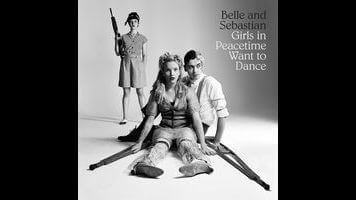Belle & Sebastian returns with its purest pop yet

Of the many acts quietly hammering away in the shadow of the alternative revolution in the ’90s, Belle & Sebastian wasn’t a strong contender for longest-lived. An apparent shunning of careerist game-playing—press interviews, world tours, exposure of any kind—was part of the group’s appeal. Its discography painted a picture of musicians preoccupied with wasted or hidden potential: “Expectations,” “Judy And The Dream Of Horses,” “It Could Have Been A Brilliant Career”—all songs about people hiding their lights under a bushel, either intentionally or unintentionally.
But the members of Belle & Sebastian were never the people in those songs, a point confidently driven home by the band’s ninth studio album, Girls In Peacetime Want To Dance. It has been a brilliant career for Stuart Murdoch and company, and continues to be, as they expand their sonic palette to include shades of Moroder-esque disco, old-world folk, and filter house. For a record that begins with Murdoch telling tales from his days as a bedridden youth, Girls In Peacetime ultimately proves to be Belle & Sebastian’s most continental album to date.
About that opening track: “Nobody’s Empire” is a rarity for Murdoch—pure autobiography—but his appealing songwriting has often featured character-based lyrics with a depth and a detail that’s easily mistaken for memoir. Coming off of the longest character study he’s ever attempted—a feature-length adaptation of God Help The Girl—the newly minted filmmaker’s writing sounds refreshed on Girls In Peacetime Want To Dance. He’s thinking globally while creating locally, jumping into the mind of a girl who’s stressed out about Middle Eastern violence in “Allie” or railing against a “grubby little red MP,” “men in frocks,” and other incarnations of “The Cat With The Cream.” Even at that grand scale, Girls In Peacetime is so much more intimate and precise than anything on the last Belle record, 2010’s Write About Love, where so many numbers spun their wheels in one lyrical hook or another. Even while drawing upon Murdoch’s bouts with chronic fatigue syndrome, Belle & Sebastian sounds more energized than it has in more than a decade, since the release of the group’s first sea-change album, Dear Catastrophe Waitress.
Now, as then, these shifts have to do with the work of a new outside producer: Ben H. Allen, who’s been behind the boards for albums by CeeLo Green and Deerhunter, and who helped put Animal Collective on the big stage with Merriweather Post Pavilion. Allen’s input pushes Belle & Sebastian into a roomier, groove-based headspace, as past flirtations with the dance floor blossom into the nightlife narrative “The Party Line” and the Europop epic “Enter Sylvia Plath,” the lyrics of the latter riffing on the work of the titular author as well as the bland platitudes in Chinese fortune cookies. In verses of heist-movie jazz and a klezmer-inspired chorus, “The Everlasting Muse” describes a songwriter drawn into a big pop push by mystical forces (“And on the napkin silk / She weaves a manuscript with skill / An intro, outro, middle eight”), but Belle & Sebastian has never required such coercion. Girls In Peacetime Want To Dance is the purest expression of the big, bright sounds that have always been within the band, visions of Belle & Sebastian as Naked-era Talking Heads or an ABBA for 2015.
As ever, there are momentary hiccups whenever Murdoch passes the microphone to his bandmates (though the Sarah Martin-led “The Power Of Three” is quite lovely), but Belle & Sebastian has never sounded more comfortable, or so much like itself, in such slick surroundings. Its troubled protagonists have seven-year plans and nicer apartments now, but they’re not too old for vintage B&S material like crises of faith or allusions to the French new wave. Girls In Peacetime Want To Dance finds Belle & Sebastian aging gracefully, a luxury that’s never been extended to the subjects of the group’s songs.